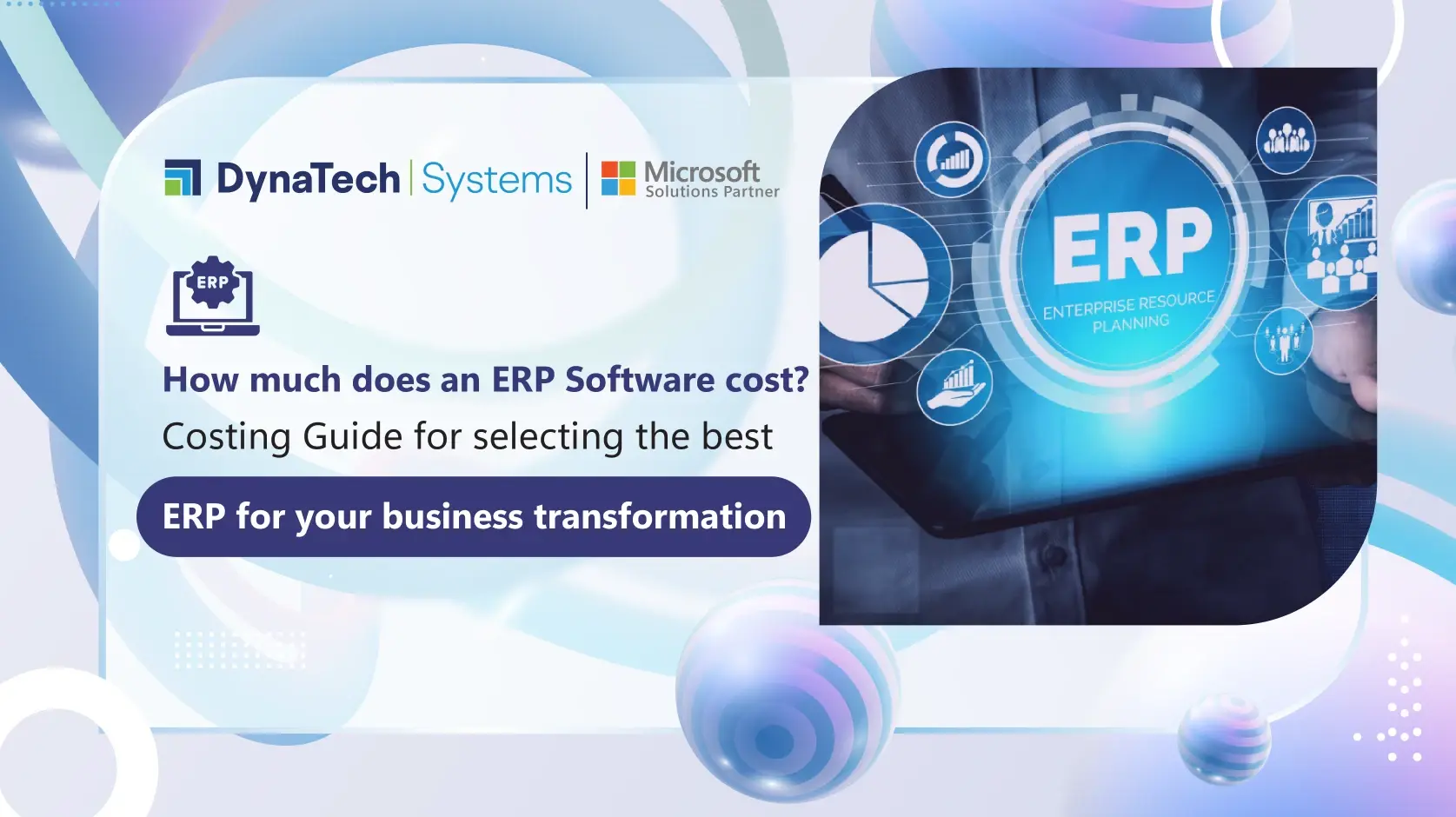Fragmented systems and information silos can cripple operational efficiency and informed decision-making in any organization. Hence, choosing an Enterprise Resource Planning (ERP) system is a significant decision for any business. It can streamline operations, improve efficiency, and boost your bottom line. But before you embark on this transformative journey, a crucial question arises: how much does Enterprise Resource Planning cost?
While there's no one-size-fits-all answer, understanding the cost structure of ERP systems empowers you to create a realistic budget and select the solution that best aligns with your unique needs. This blog is your comprehensive guide to understanding the cost of implementing an ERP system and what to consider when selecting the best ERP software for your business.
Demystifying the Cost of ERP Software: A Multifaceted Equation
ERP software costs can vary widely depending on several factors. It's essential to recognize that the initial purchase price is just a single aspect of the total cost of ownership (TCO). Here's a breakdown of the key components that contribute to ERP software cost:
1. Software Licensing Fees
The core component of ERP software cost is the licensing fee. This can be structured in several ways:
- Perpetual Licensing: A one-time purchase that allows you to use the software indefinitely. This model typically involves a higher upfront cost but can be more economical in the long run.
- Subscription Licensing: A recurring fee, usually billed monthly or annually. This model often includes updates and support, making it a popular choice for many businesses.
- User-Based Licensing: Costs are based on the number of users accessing the system. This is common in both perpetual and subscription models.
- Module-Based Licensing: Costs depend on the specific modules or functionalities you need. This allows a more tailored approach, ensuring you only pay for what you use.
For instance, Microsoft Dynamics ERP pricing offers flexible licensing options, including both subscription and perpetual models, to cater to different business needs and budgets.
2. Implementation Costs
The cost of implementing an ERP system can be substantial and often exceeds the initial licensing fees. Implementation costs typically include:
- Consulting Fees: Engaging ERP consultants to guide you through the implementation process. This ensures that the system is configured to meet your specific requirements.
- Customization: Tailoring the ERP software to fit your unique business processes. Customization can be complex and time-consuming, but it's crucial for maximizing the software's value.
- Training: Educating your employees on how to use the new system effectively. Training costs can vary depending on the depth and duration required.
- Testing: Ensuring that the ERP system functions correctly before going live. This involves thorough testing of all modules and integrations.
3. Maintenance and Support
Ongoing maintenance and support are necessary for keeping your ERP system running smoothly. These costs can include:
- Software Updates: Regular updates to ensure your ERP software remains current with new features and security patches.
- Technical Support: Access to technical assistance for troubleshooting and resolving issues.
- System Upgrades: Periodic upgrades to newer versions of the software, which may include enhanced functionalities and improvements.
4. Infrastructure Costs
Infrastructure costs can vary, depending on whether you choose an on-premises or cloud-based ERP solution.
- On-Premises ERP: Requires investment in hardware, servers, and IT personnel to manage and maintain the system.
- Cloud-Based ERP: Typically involves a subscription fee that includes hosting, reducing the need for significant upfront infrastructure investment.
Did You Know? Microsoft Dynamics ERP offers both on-premises and cloud-based solutions, enabling businesses to choose the option that best fits their infrastructure and budget requirements.
Beyond the Software: Unveiling Hidden Costs of ERP Implementation
While the software itself represents a major cost component, a successful ERP implementation necessitates considering additional factors:
- Data Migration: Moving your existing data into the new ERP system can be a challenging and time-consuming process. The quality and structure of your existing data will significantly impact migration costs.
- Change Management: Transitioning your workforce to a new ERP system needs comprehensive training and change management initiatives. Budget for employee training and support to ensure user adoption and maximize the system's benefits.
- Ongoing Maintenance: ERP systems require ongoing maintenance to ensure optimal performance, security updates, and address any evolving business needs. Factor in annual maintenance costs when calculating your total cost of ownership (TCO).
Tips for Managing ERP Software Costs
By understanding the cost structure of ERP software, considering implementation factors, and employing cost-saving strategies, you can make better decisions and embark on a successful ERP implementation journey. Here are the next steps:
- Evaluate Your Needs: Conduct a thorough business process analysis to identify your specific pain points and desired functionalities.
- Research and Compare: Explore various ERP solutions and compare features, pricing models, and industry alignment.
- Request Demos and Consultations: Engage with shortlisted vendors to gain a deep understanding of their solutions and discuss your specific requirements.
- Calculate Your TCO: Factor in all cost components, including software, implementation services, data migration, and ongoing maintenance, to create a realistic budget.
- Partner with a Trusted Vendor: Select a vendor with a proven track record of successful ERP implementations in your industry.
Comparing Popular ERP Software - So You Don’t Have To
Here's a table comparing some of the most popular ERP software available in the market.
|
ERP Software |
Pricing (per user/month) |
Implementation Cost |
Key Features |
Best For? |
|
Microsoft Dynamics 365 |
Essentials: $70 Premium: $100 F&O: $180 |
$20,000 - $500,000 |
Comprehensive financial management, supply chain operations, manufacturing, and robust integrations. |
Flexible pricing, scalable for businesses of all sizes, extensive support, and continuous updates. |
|
SAP S/4HANA |
Starts at $200 |
$100,000 - $1,000,000+ |
Advanced analytics, AI integration, industry-specific solutions. |
Higher cost, complex implementation, better suited for large enterprises. |
|
Oracle ERP Cloud |
Starts at $175 |
$100,000 - $1,000,000+ |
Complete suite of financial, project management, and procurement solutions. |
High cost, extensive customization, requires skilled IT resources. |
|
NetSuite |
Starts at $99 |
$25,000 - $500,000 |
Cloud-based, financial management, CRM, e-commerce integration. |
Affordable for SMEs but may lack deep industry-specific features. |
|
Infor CloudSuite |
Custom pricing |
$50,000 - $500,000+ |
Industry-specific solutions, cloud-based, AI-driven insights. |
Custom pricing can be expensive, complex for smaller businesses. |
Why Microsoft Dynamics 365 Shines Brighter Than Others?
- Flexible Pricing Options
Microsoft Dynamics ERP pricing plans are so flexible that it can cater to different business sizes and needs. Whether you are a small business or a large enterprise, D365 provides affordable options with its Essentials and Premium plans, as well as comprehensive solutions for larger businesses with Finance and Operations.
- Scalability
D365 is highly scalable, making it suitable for businesses at various growth stages. As your business expands, D365 can easily scale to accommodate new users, additional modules, and more complex functionalities without significant disruption or additional costs.
- Comprehensive Functionality
Microsoft Dynamics 365 delivers a complete suite of ERP functionalities, including financial management, supply chain operations, manufacturing, and robust integrations with other Microsoft products like Office 365 and Power BI. This seamless integration enhances productivity and streamlines operations.
- User-Friendly Interface
D365 features an intuitive and user-friendly interface, reducing the learning curve for employees and ensuring quicker adoption. The familiar Microsoft interface helps users navigate the system efficiently, leading to increased productivity and reduced training costs.
- Continuous Updates and Support
With Microsoft Dynamics 365, you benefit from continuous updates and improvements, ensuring that your ERP system stays up-to-date with the latest features and security patches. Additionally, Microsoft provides extensive support and training resources to help businesses maximize their investment.
- Customization and Flexibility
D365 offers extensive customization options, empowering businesses to customize the ERP system to their specific needs. Whether you need to customize workflows, reports, or integrations, D365 provides the flexibility to adapt the system to your unique business processes.
- Strong Vendor Reputation
Microsoft is a trusted and reputable vendor with a long history of providing reliable and innovative software solutions. Choosing D365 means partnering with a company known for its commitment to high quality and customer satisfaction.
Final Thoughts
The cost of ERP software varies widely based on several factors, including the number of users, customization needs, deployment method, and ongoing maintenance. Microsoft Dynamics ERP cost is very flexible. This platform offers high scalability and robust features, being an excellent option for businesses looking to implement an effective ERP system.
When selecting an ERP system, it's essential to consider not only the upfront costs but also the total cost of ownership and potential ROI. By carefully evaluating your needs, comparing multiple vendors, and considering long-term scalability, you can choose the best ERP software for your business and ensure a successful implementation.
Need more clarity on the costs? Our consultants at DynaTech Systems can guide you in the entire journey, Contact Us today for more!




























